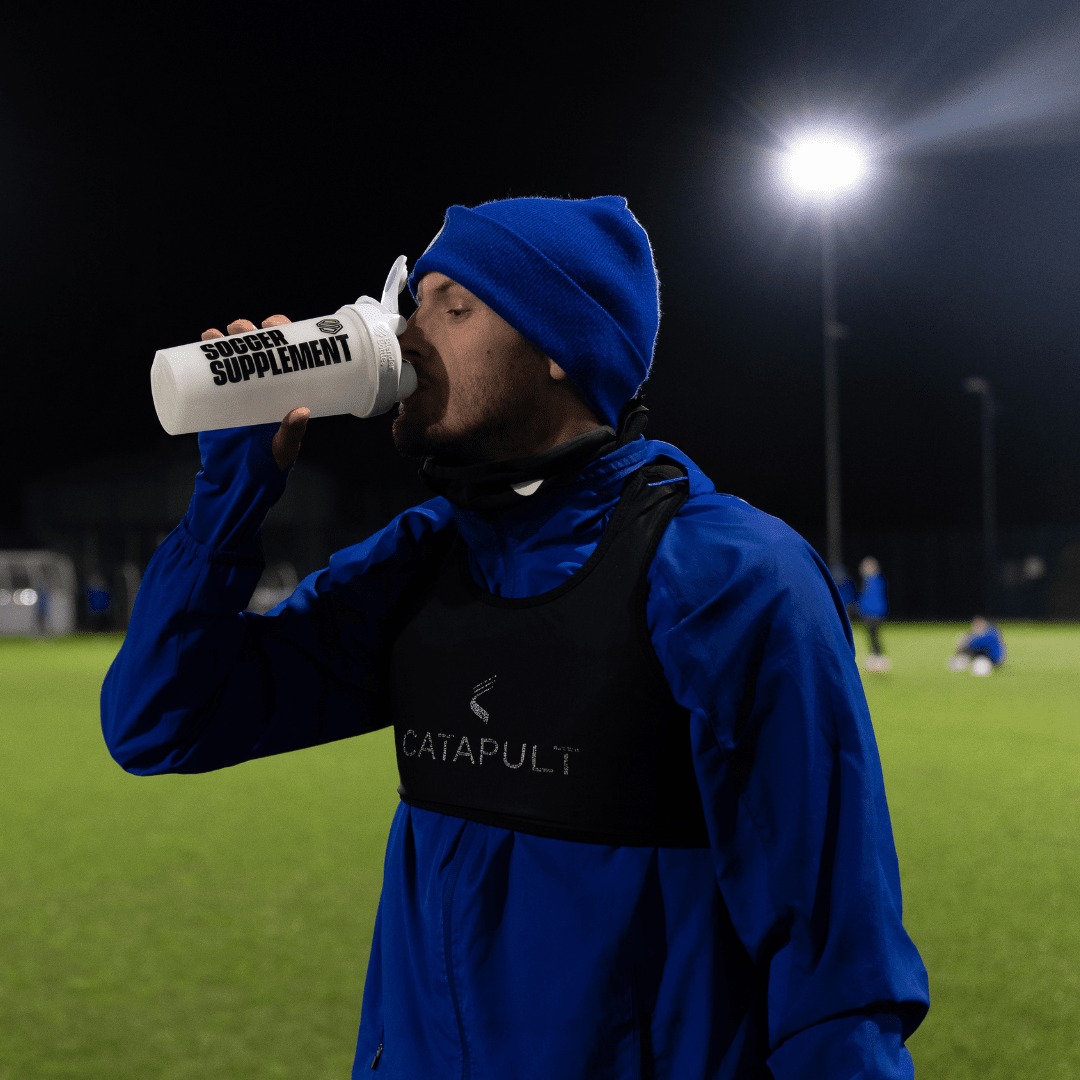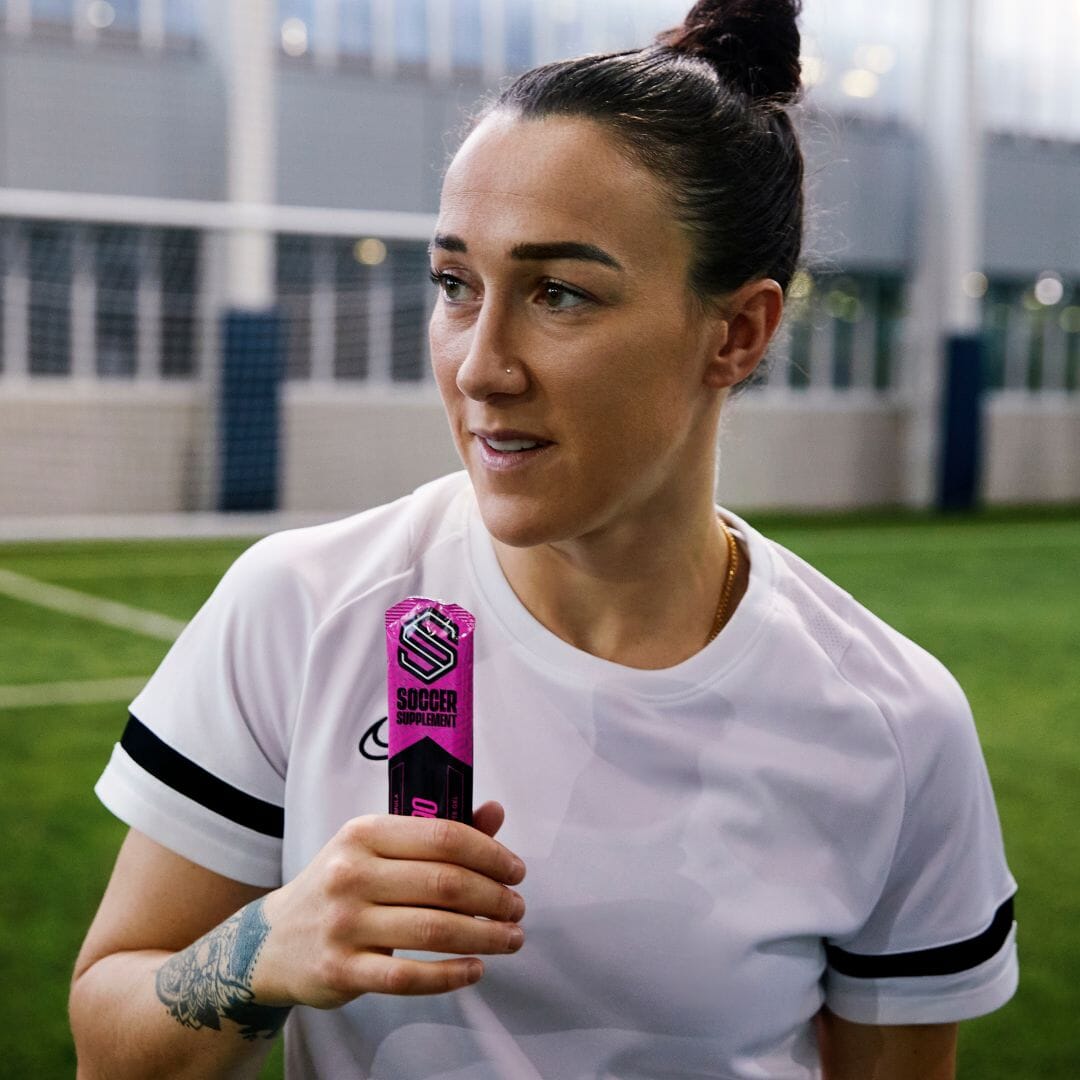Download Your FREE Footballer Nutrition Guide now.

It wasn't all that long ago that a footballer's diet was a pre-match fry up with all the trimmings, followed by a slice of orange at half-time and a pie and pint to wash it all down after the final whistle. Brian Clough even encouraged his players to drink before a cup final.
But those days are well behind us now, and a footballer's diet today is carefully tailored to the needs and high intensity of the beautiful game. Nutrition is top of the list for a football player's diet, focusing on tailoring the diet to a training schedule and ensuring that footballers play at the top of their game.
Top clubs have nutritionists and use sports science to put together a balanced diet for each player. But for anyone playing in the lower leagues, it can be tricky to work out where to start. This guide will show you the different elements of a footballer's diet and how professionals put nutrition to use on match day.
What's in a Football Player's Diet?
There's no “one-size-fits-all” when it comes to footballer nutrition. Every player needs to base their nutrition on their body weight, height, body fat percentage, and position on the field.
The position you play can play a massive role in determining the foods you eat. The average professional midfielder runs for an average of 11.27km per game. But for strikers, that drops to 9.64km, so the necessary nutritional intake for each position changes. But certain elements are included in all dietary plans to help player's boost their performance and stay healthy.
Carbohydrates
Carbs are the fuel that keeps players on the pitch. A football player relies heavily on carbohydrates to fill up the glycogen stores that give them energy. However, the body's glycogen stores are limited and quickly deplete during exercise, which means a footballer needs to have a high percentage of carbs in their diet. Most players tend to focus on non-refined carbs, such as:
- Whole grains — Whole wheat bread, pasta and rice
- Vegetables — Broccoli, peppers, potatoes (normal and sweet) and peas
- Fresh fruit — Apples, pears, bananas and blueberries.
- Beans — Lentils, kidney beans and black beans
- Dairy — Low-fat milk and Greek yoghurt
Protein
Protein is essential to build muscle and repair any damage to muscles from football training or matches. Footballers need to consume a lot of protein to maintain their form, develop muscles and complete a full recovery from exercise. They do this by eating certain foods, such as:
- Poultry
- Lean red meats
- Beans
- Eggs
- Fish
Alongside eating food that contains protein, players will also use protein shakes. Protein shakes are an excellent way for players to hit their protein intake targets easily. While meals and food play a big part, eating a large meal before a match can cause discomfort and lower performance. Protein shakes provide the same nutritional benefits without making players uncomfortable on the pitch.
Fat
There's no escaping the negative connotations of the word "fat," and you might assume that athletes would avoid fatty foods. But, there are healthy fats and unhealthy fats, and the good ones are a vital part of any diet and help increase nutrient absorption in the body.
However, moderation is paramount to reap the benefits of fat as too much can put players at risk of increasing their fat mass, which will slow them down on the pitch and reduce performance. Players tend to focus on foods that contain monounsaturated fats and omega-3 fatty acids, such as:
- Olives
- Avocado
- Nuts (walnuts, almonds, cashews)
- Seeds (sunflower, flax, chia)
- Fatty/Oily fish (salmon, tuna, trout)
Vitamins and Minerals
Food provides us with macronutrients, micronutrients, fibre and water. We've already covered the three main macronutrients: carbohydrate, protein and fat. But micronutrients are essential too. While they don't usually provide energy, they play a significant role in a player's health and performance.
A footballer's diet will provide many of the vitamins and minerals they need, but there are some common deficiencies, including:
- Iron
- Zinc
- Calcium
- Magnesium
- Vitamin B12
These deficiencies can impair cardiovascular function and endurance, bone mineral density and immune function. To avoid the adverse effects of these deficiencies, footballers will often take multivitamins daily.
Hydration
The importance of hydration in a footballer's diet cannot be overstressed. Over 90 minutes, a footballer can sweat over a litre, making hydration vital for keeping up their performance and health in general. Dehydration can cause a drop in cognitive function, lowered aerobic capacity and lethargy, so footballers must stay hydrated before, during and after the match. To do this, most players will:
- Drink 500ml of water when they wake up
- On average, drink between 2000 and 2500ml of water each day
- Consume 1000ml of water per hour of exercise
- Monitor their body weight before and after exercise to see body mass loss
Beyond drinking water, players will also use a sports drink for hydration. These often provide hydration alongside carbohydrates and electrolytes that help fuel their performance on the pitch.
Supplements
Using supplements is common in the modern game. While a planned and balanced diet is vital, supplements allow players to manage their nutrition in a much easier and more exact way. Players use a variety of supplements for different purposes, such as:
- Protein — to build muscle and boost muscle recovery
- Energy gels — to boost energy with electrolytes and carbohydrates
- Sports drinks — for hydration
A Footballer's Match Day Diet
A professional player's diet will be rigorous every day, and it's indispensable for putting in a top performance on a matchday. Every player will have their own way of preparing for the match, but we've put together an overview of what most players will do to prepare themselves. For example, the kick-off for the match is at 3 pm.
Breakfast
They say breakfast is the most important meal of the day, and it's no different for football players. Players will kick off the day by drinking 500ml of water to start the rehydration process. Following that, they'll move onto breakfast and will usually have either porridge or eggs.
While porridge and eggs will do the trick, many players will use different grains like quinoa and make different types of eggs to give them some variety in their breakfasts. Changing what they have regularly means they’re less likely to skip a meal or have a less nutritious breakfast.
Players will often avoid a fibrous or heavy breakfast as they can take time to digest and make them feel bloated.
Lunch
With kick-off at 3 pm, players won't want to eat a large lunch. Playing on a full stomach can cause discomfort, which can distract from the match and affect performance. Most players aim to have a lunch that contains slow-releasing energy from low-GI carbohydrates like wholegrain pasta and rice.
Pre-match Nutrition
Pre-match nutrition is vital for maintaining sufficient levels of glucose, amino acids and hydration. While breakfast and lunch are part of pre-match nutrition, the hour before the game is crucial. Players tend to focus on three areas at this stage: protein, carbohydrate and hydration:
- Protein — Players will typically consume 20-25g of protein. For faster digestion and to avoid gastrointestinal discomfort, this is generally in the form of a protein shake.
- Carbohydrate — Players aim for 30-60g of carbohydrate. Again to avoid discomfort, this is usually in the form of a gel or powdered drink.
- Hydration — Players will drink water or hydration supplements like Hydrate90 to avoid dehydration in the first half
While most players focus on these areas, some players will also use caffeine and creatine to boost their performance.
In-Game Nutrition
After 45 minutes on the pitch, revitalising is as important as the manager’s team talk. While in the changing room, players will focus on rehydration using water and energy gels. These rehydrate the players and resupply glycogen stores and give the player the energy they need for the next 45 minutes.
Post-match Nutrition
After the final whistle, players still need to keep on top of their nutrition. Failing to do so can cause prolonged recovery time and cause issues in training before the next match. Professional players focus on the three "Rs" of post-match recovery:
- Rehydrate — This stage involves consuming fluid to achieve fluid balance. Fluid requirements vary from player to player, so there’s no single recommendation for fluid intake. In general, players should aim to drink 1000ml of water per hour of exercise.
- Replenish — Exercise depletes the body’s glycogen stores, and after 90 minutes of football, players need to focus on replenishing them. The focus for this is to hit a specified carbohydrate intake for the day. Players achieve this through one meal or separate meals and supplements.
- Repair — Players need to consume an adequate amount of protein to stimulate muscle protein synthesis (MPS). This process uses protein to repair and create new proteins for muscle recovery and growth.
Want to Eat like a Professional Footballer?
As we've already stated, there's no one size fits all when it comes to nutrition for football. Every player is different and needs to tailor their diet to their body weight, height, style of play and position. If you're looking to up your game with a personalised plan that suits your training schedule, check out our expert guide for creating a footballer's diet.
Are you looking to up your game? Check out our range of supplements that cover every aspect of the beautiful game, including protein, energy and hydration. If you’re looking to boost your performance in training, check out our new training plan.
Download Your FREE Footballer Nutrition Guide now.







